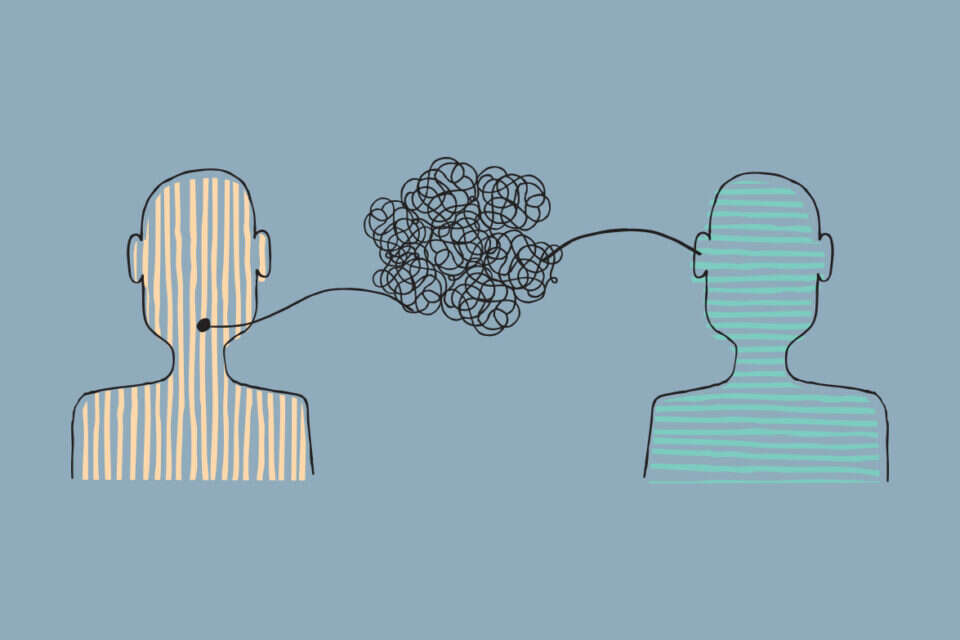does not contradict
What would you answer if they asked you what is the most difficult feature for you?
If they ask me, I will answer without hesitation: the trait that hinders the relationships in my life is the tendency to avoid unpleasant conversations, in more or less diverse and creative ways.
The readers of the column who may know me from television or writing, may raise an eyebrow.
I am aware that my media image is that of a woman with firm opinions who is not ashamed to say what she thinks or feels, even when it comes to criticism or dealing with conflict.
It's true, this image reflects a significant part of me, a real part, but it doesn't contradict the other part, which is evasive and embarrassed.
A submissive woman
One of the most prominent examples is a case that happened in February of this year, when a man who was looking for love, according to him at least, visited the show's studio.
He said that he wanted a "submissive woman", but "the problem is that a submissive woman is not smart enough for me. It's also important to me that she be thin. I don't like fullness".
Well, if you search on Google: "looking for a submissive woman", you will be able to prove that indeed, in cases where I meet a certain type of type, I have no problem looking him in the eyes and saying harsh things, my voice will not shake even for a moment.
In the same way, when a talkbackist writes offensive words, about me or anyone else, I will not hesitate to put him in his place.
Last Passover, while we were waiting more than two hours for the security check before the flight, some families decided to open the separation tape and bypass the suckers who have been waiting for three hours.
Without getting confused, I organized some of the guys I knew in line (after the long waiting time we were already really solidified) and we stood as a buffer between the insolent families at the checkpoint, blocking with our bodies the possibility that they would put their luggage on the conveyor belt.
When they tried to approach, I told them in a firm voice: "None of you will check in, before everyone who is standing here in line and arrived before you has finished."
Dozens of people opened their cell phone cameras and took pictures of the rescue team we organized.
It really didn't bother me.
Even if this sentence sounds pretentious to you, this is the truth: I like to feel that I am fighting for a just cause.
It gives me strength.
The deceptive people
It seems to us that avoiding confrontation or conflict is a trait that belongs to people who are shy or classic introverts, those who are uncomfortable returning a dish to the kitchen in a restaurant even if they found a hair in the plate, or those who suffer from social anxiety and avoid eye contact during conversation, or those for whom all "small talk" He is hell on earth.
But according to a short investigation I conducted, there are also many people of the following type, and I am among them: we are the ones who are not afraid of social interactions and even enjoy them, who can relatively easily speak in front of an audience or represent the group to which we belong in the fight for rights, but alongside the ability to fight for the common good, We are also the people who are unable to deal with a situation of conflict when it comes to our personal and private things, when it comes to a one-on-one situation where we have to say what is bothering us or ask that our needs be considered.
We are the people for whom seemingly simple conversations are impossible.
Money in the trash
In cases where I find myself in a situation where I have to remind a person to return an amount of money I paid for them, the rule is very simple: it will never happen.
To be resentful, to be upset - that's right, to grumble about it to my close friends - of course, but not to say anything on the subject to the only person to whom I am supposed to direct my feelings.
A few weeks ago I arrived at a work meeting at lunchtime, and the feeling of hunger took hold of me.
Eight other people were present at the meeting, most of us know each other only superficially.
I opened the delivery app and asked those present if anyone was hungry, because I was ordering something for myself.
Several of those present expressed interest and chose a dish.
At that moment I already knew: there is only one and only one chance that this meal will not cost me 680 shekels - only if those present offer to pay me back on their own initiative.
There is no other possible scenario.
When the shipment arrived, we were already in the middle of the meeting.
Two asked me how much they owed me for the order and I mumbled the amount in embarrassment.
Four others forgot to ask.
I can understand, it can happen to anyone.
The thing is, if a person pays for my food and I forget to pay them back, I would be very, very happy to be reminded.
I don't want to be obliged.
I imagine that those people I was ashamed to mention, feel exactly the same.
mom and me
If you read the previous paragraph and didn't understand what I'm doing and what kind of embarrassment I'm talking about, then know that I adore you.
There are those who really do not take into account, who forget about it and move on, the "liberators".
I wish that was the case, but I'm not one of those saints: I remember and don't forget, monitor, get angry, get angry at those who didn't remember and most ridiculously - don't say a word, and thus don't allow the situation to be corrected.
It may be a hereditary trait or a behavior I internalized from my mother.
I remember her coming back with my father from spending time at the movie theater with friends, walking around the house upset, saying over and over again that she paid for the movie tickets and again they forgot to give her back.
I don't remember my mother bringing up the obvious option, which is to simply remind them of what they forgot.
I don't even remember you bringing up the option to ask someone else to pay for the tickets the next time they go out together.
I definitely remember her paying for everyone's tickets at the next outing as well and sharing her frustration with us again when she returns home, as if it were a fate that cannot be changed
they will see me
A major reason why I am unable to demand my money back is the fear of being seen as stingy or petty or considerate or ungenerous.
It scares me because I'm really not like that, at least not in my own eyes.
One of the things that strengthens my self-worth and helps me sleep at night is the belief that I am generous and share what I have with others.
The point is that I want to choose when and how and to whom to show this generosity.
Immediately after I sent my editor the draft of the column before you, he said I must call those free eaters, ask for the money and record my feeling and their reaction.
He thought that maybe their reactions would make me think a little differently.
I burst out laughing at his words and explained to him that he and I are more likely to go out to dinner with Beyoncé and Jay Z than I am to contact them and ask for a refund.
By the way, if the meal with Beyoncé and J.Z does come true, I will pay for all of them with great joy and will not be tormented even for a moment.
cognitive dissonance
I talked about it with a smart friend who is also a doctor of psychology.
She said that in her opinion, one of the reasons why it is difficult for some of us to ask a person to return a loan or to demand something that makes another person uncomfortable, is the fact that it creates cognitive dissonance, that is, a gap between what I think about myself and my actual behavior, a gap between the large woman that I am I want to be with the one who asks someone to pay her back a few tens of shekels.
When we find it difficult to reconcile the gap between who we would like to be and our needs, we are sometimes willing to give up what we need to serve the image we aspire to.
By the way, money is probably the subject that people have the most difficulty talking about.
A study from the University of London found that people would rather have a break-up conversation than ask their boss for a raise.
Bish business
Only four times in the 15 years that I have had a clinic, I have had to tell an employee that I am filling up Mata Lachma and have to end her work.
I particularly remember a case where I had to do this because the business did not justify the cost of her service, literally.
After many months in which I continued to pay her despite the deepening deficit in the bank, I realized that enough is enough, I can't continue to let my problematic trait run the business.
I invited the employee to talk, sat down opposite her - and started crying.
While crying I explained to her that I could not afford for her to continue working with me.
How did the conversation end?
She approached me, put her hand on my shoulder and comforted me(!) that everything was fine and that she would find another job.
It will be remembered as one of my embarrassing moments as a manager, and still, at the edge of disappointment with myself there is still a part that takes comfort in this behavior, that says "Here Paula, you see? You are a good woman".
gain and loss
The challenge is to have a conversation with a person who is both, who is not against me but for him, without getting angry or filled with resentment.
Do the attempts to maintain the image of the "good woman" by giving up defining my needs really achieve for me the image I want in the eyes of the other party?
Does avoiding the conversation make someone think favorably of me?
The depressing answer is that most likely not, or rather - absolutely not.
Not only that, I pay a heavy personal price, I feel that it hurts me: the emotional load is greater than I want, it sometimes keeps me from sleeping, and I not infrequently do work myself that I have already paid someone else for.
The optimistic point is that there is a slight improvement: I used to not even be able to call the restaurant to let them know that we couldn't come and it would have stressed me out and consumed energy, it would have taken me a while to muster up the courage to have a half-minute conversation with a waiter or shift manager who were completely unaware of my existence.
I am proud to share that today I cancel a table at a restaurant relatively easily.
I made progress.
For years I have been reading books and listening to lectures about assertiveness and boundaries and dealing with conflicts.
The implementation, of course, is much more difficult than the understanding, but I am on the right track, I hope so.
I thought about sitting down with myself for a constructive criticism conversation and commenting that it's worth increasing the rate of internalization, but who am I working for anyway?
I'll probably find a way to avoid this difficult conversation as well.
The delivery app is already open, and I promise to pay and not to monitor resentment.
Just write me what you prefer: stir-fry or sushi?, photo: Paula Rosenberg
Do this to me:
If you identified with some of what was written in the column and you want to read about strategies that help change the situation, this book opens your mind.
I go back to him from time to time and he helps me cope. It's just important to remember that there are no magic tricks, only processes. Photo: The cover of the book "The Book of Assertiveness"
Info@paulanatural.co.i
were we wrong
We will fix it!
If you found an error in the article, we would appreciate it if you shared it with us









